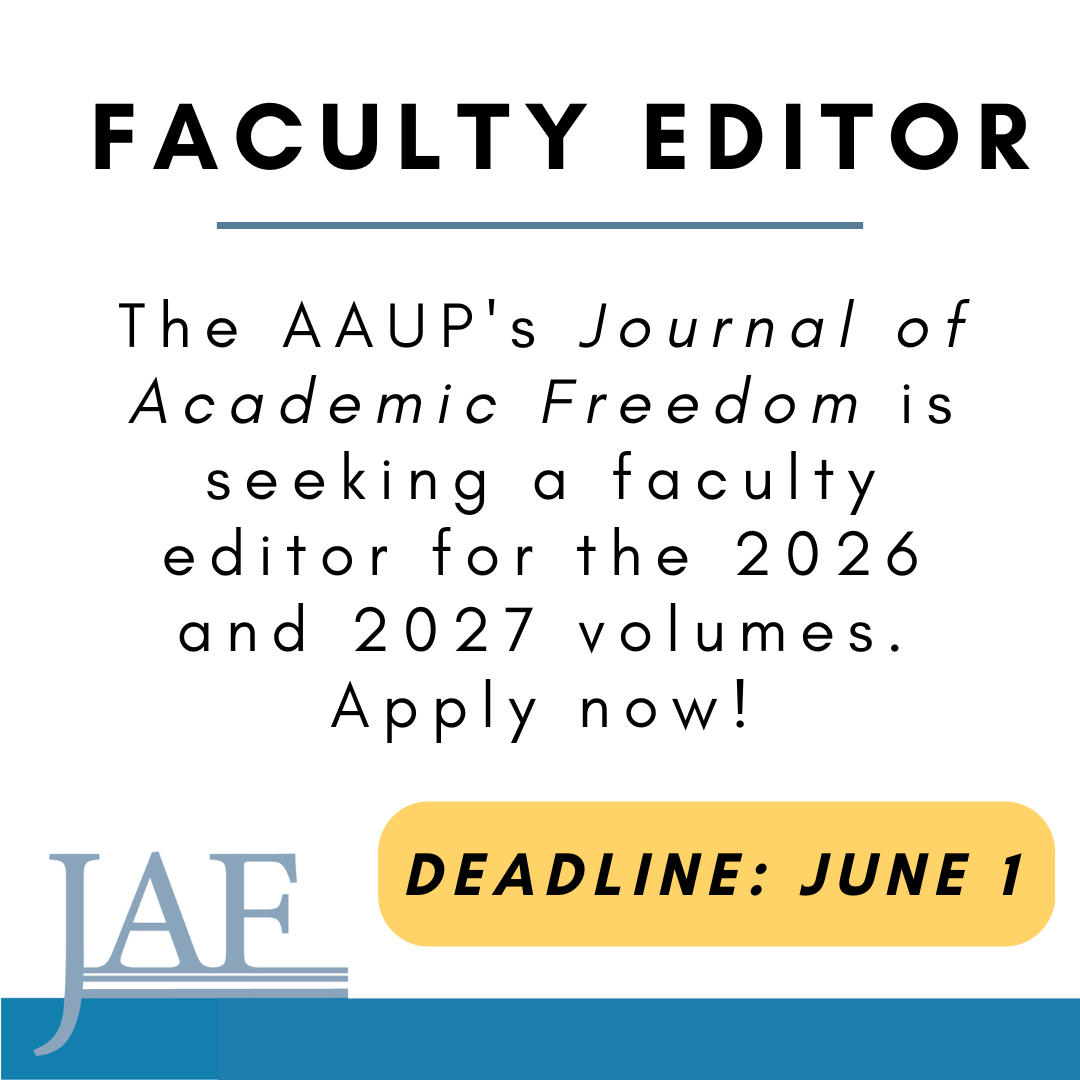- About
- Programs
- Issues
- Academic Freedom
- Political Attacks on Higher Education
- Resources on Collective Bargaining
- Shared Governance
- Campus Protests
- Faculty Compensation
- Racial Justice
- Diversity in Higher Ed
- Financial Crisis
- Privatization and OPMs
- Contingent Faculty Positions
- Tenure
- Workplace Issues
- Gender and Sexuality in Higher Ed
- Targeted Harassment
- Intellectual Property & Copyright
- Civility
- The Family and Medical Leave Act
- Pregnancy in the Academy
- Publications
- Data
- News
- Membership
- Chapters
From the Editor: Sharpening Our Professional Focus
American public education is quite healthy, thank you. But it is under attack. From preschool to grad school, public educational institutions are being pressured through new funding constraints, demands for quantifiable accountability, competition from the for-profit sector, and more. It is no longer enough to say that educators and their schools deserve more money, that the bean counters take a reductive view of education, or that free-market superiority is a myth. Nor can private institutions stand aside from the onslaught: the new attitudes toward education and the marketplace pressure them, too.
Advocacy and organizing, the twin activities at the heart of the AAUP, will be fully effective only when faculty members everywhere challenge the portrayals of educators by those who would dismantle the American system of education. When New Jersey governor Chris Christie says he’d like to give an education union a punch in the face because unions care only for wages and benefits and not for students, all of us working in education should be concerned. Clearly, we have not focused enough attention on explaining what we do—and on what our unions (including the AAUP Collective Bargaining Congress) support. Our activities, and those of the groups that bargain for us, have never been simply about money.
This issue of Academe starts off with a warning from journalist Juan González that we have “come too far and fought too hard” to stop fighting for real and vigorous education in the face of attempts to roll back the broad social progress of the past century. This article is followed by a piece from Steven C. Ward, who warns us that the reforms of public education that began during the Bush era are now affecting higher education—and we cannot ignore them. Next, Mihran Aroian and Raymond Brown look at student evaluations of teachers— a potentially useful but flawed tool. David Schultz, in the article that follows, describes what he sees as the coming demise of the corporate university. The demise may be hurried along by the decline of for-profit universities such as the University of Phoenix, which have provided a model for those wanting to corporatize other educational institutions.
On a different track, Carrie E. Rood and Michelle L. Damiani discuss one means for increasing disability awareness on campus, a move toward a necessary inclusiveness that should permeate all of our institutions, educational and otherwise. Inclusivity, of course, is based on the need for diversity, and Donald Earl Collins follows with an exploration of how historically black colleges and universities can improve their contemporary standings.
Though we should resist the remaking of our universities on the corporate model, there is no reason colleges and universities cannot work with businesses where that model is appropriate. Vicki L. Baker and Peter Boumgarden show how the liberal arts can augment corporate goals, providing a positive link rather than increasing tension. In the next article, Jacob Felson, looking at academic advising, wonders why educators have not yet developed tools that match the possibilities of today’s digital world.
Kamala Visweswaran wraps up the features section in our print edition with a discussion of another area where politics affect education: the struggles of Palestinian academics under Israeli occupation.
Be sure to visit Academe on the web for online-only features. The online edition of this issue includes Jid Lee’s examination of the small fights we all participate in when we should be concerning ourselves with larger issues and Faiza Abdur Rab’s plea for a reevaluation of how academia treats research in developing countries.




